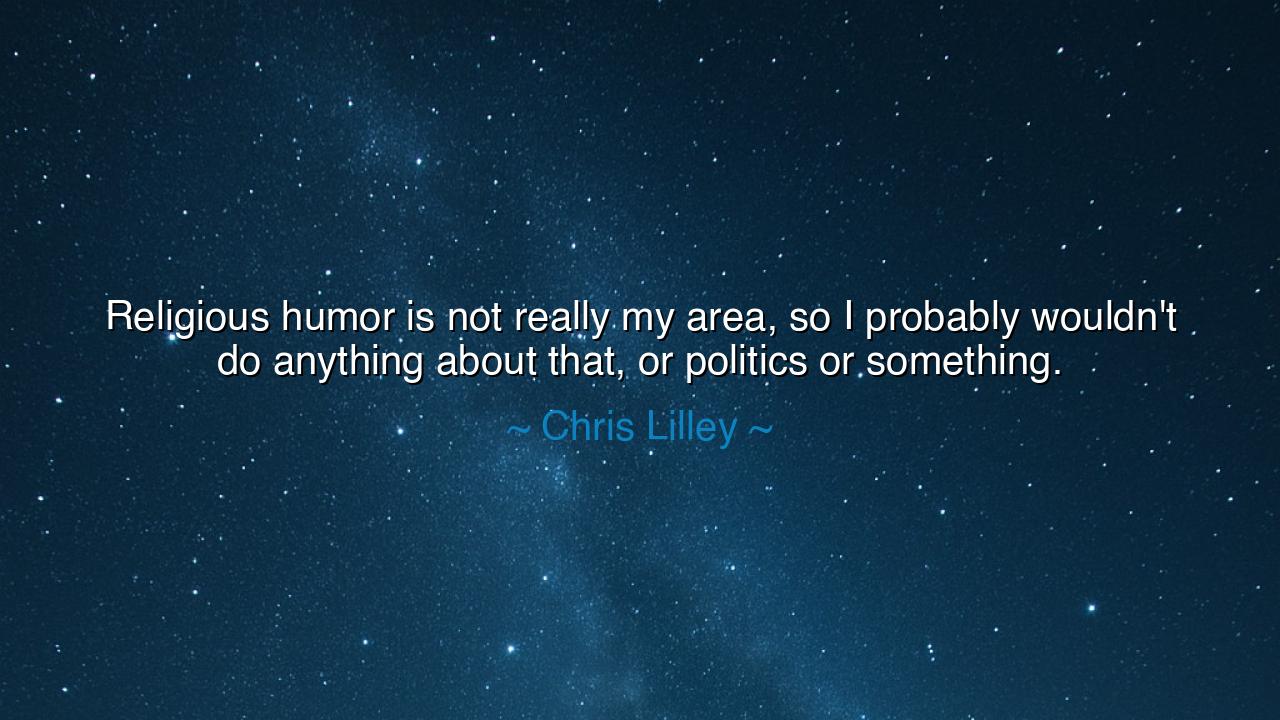
Religious humor is not really my area, so I probably wouldn't do
Religious humor is not really my area, so I probably wouldn't do anything about that, or politics or something.






Hear the words of Chris Lilley, the craftsman of laughter and mirror of modern manners, who said: “Religious humor is not really my area, so I probably wouldn’t do anything about that, or politics or something.” At first glance, these words seem simple—a man speaking of what he chooses not to jest about. But beneath them lies the voice of discernment, the mark of one who understands that not all fires are meant to be stoked. For humor, like truth, carries both power and peril. The wise jester knows that the tongue, though light as air, can wound more deeply than the sword.
The ancients would say that the measure of wisdom lies not only in what one speaks, but also in what one chooses to leave unspoken. In every age, there have been those who have used humor as a blade, cutting through hypocrisy and pride. Yet there have also been those who, in their eagerness to provoke, have set ablaze the fragile bridges between men. Lilley, in his restraint, walks the older and nobler path—the path of the mindful artist who knows that laughter, when misdirected, can become cruelty disguised as wit. To forgo religion and politics as subjects of mockery is not cowardice—it is respect for the unseen threads that bind communities together.
Religious humor, he says, is not his area. This is no accident, for religion is the language of the soul, a realm sacred and trembling. To jest upon it carelessly is to disturb that which gives meaning to countless hearts. Many through history have fallen to this folly—believing that irreverence is courage, when in truth, true courage lies in understanding the limits of one’s reach. The Greek tragedians knew this balance well. Aristophanes, in his comedies, mocked gods and men alike, but always with a reverence for the divine order that underpinned his world. He wielded laughter as a philosopher’s tool, not as a torch of contempt.
And as for politics, it has ever been a tempest that devours those who think to master it through mockery. The Roman satirist Juvenal once turned his pen against corruption, exposing the vices of senators and emperors. Though his words were clever, they carried a cost. His satire became his exile, for power suffers laughter even less than truth. Thus, the artist who laughs at the powerful must first measure his courage against their wrath. Chris Lilley, though a comedian of great range, understands this ancient peril. His humor seeks not to divide but to reveal—to show the folly in daily life, the beauty and absurdity in the human condition, without striking at the sacred or the political.
For humor, at its highest, is a bridge, not a weapon. It brings people together through shared recognition, not through scorn. The man who chooses his subjects wisely serves not only art but also harmony. In the words of Confucius, “The noble man is cautious in his speech.” To know one’s limits is not weakness—it is mastery. Lilley’s humility, then, is his strength. He knows that to mock faith or power without wisdom is to stir storms one cannot calm. But to draw laughter from the simple truths of humanity—that is divine.
We may see a reflection of this in the story of Charlie Chaplin, who too lived in an age of great tension. When the world burned with the fires of tyranny, Chaplin dared to laugh—but even then, he did so not to mock the suffering, but to expose the madness of pride. His Great Dictator was not an act of ridicule, but of redemption—a reminder that laughter can humble the cruel only when born from compassion, not arrogance. The wise comedian, like the wise king, knows the sacred duty of restraint.
So, my listener, take this teaching to heart: not all that can be laughed at should be. The power of humor lies not in its reach, but in its purpose. Speak not merely to provoke, but to awaken. Choose your words as a craftsman chooses his tools—each with intention, each with care. Let your laughter be a healing flame, not a consuming fire. The world has no shortage of mockers, but it hungers for those who can make it smile without tearing it apart.
Thus, in Chris Lilley’s quiet wisdom, there is a lesson for all who create, teach, or speak: to know where silence honors more than speech, and where laughter must yield to reverence. For mastery does not lie in saying everything—it lies in knowing that sometimes, to refrain is the truest art of all.






AAdministratorAdministrator
Welcome, honored guests. Please leave a comment, we will respond soon